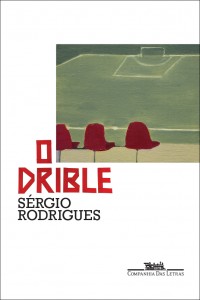About the author
 Sérgio Rodrigues (Brazil, 1962), fiction writer, literary critic and journalist, is the author of eleven books of various genres: novels, short stories and non-fiction.
Sérgio Rodrigues (Brazil, 1962), fiction writer, literary critic and journalist, is the author of eleven books of various genres: novels, short stories and non-fiction.
His novel ‘O drible’/The Feint (Companhia das Letras, 2013) was awarded the Grande Prêmio Portugal Telecom 2014, the most important of the Portuguese language for a single book. It is a literary celebration of the history of Brazilian football that former player Tostão called, in his syndicated column, “the book I wish I had written”.
‘O drible’ was launched in Spanish by Anagrama in May 2014 as El regate (translated by Juan Pablo Villalobos), and in French by Éditions du Seuil in March 2015 as Dribble (translated by Ana Sardinha and Antoine Volodine). The Portuguese edition was out in September 2015, and a Danish translation is under way by Anton & Ludwig.
The historical novel ‘Elza, a garota’/Elza: the Girl (Nova Fronteira, 2009) was published in Portugal in 2010 by Quetzal and in the USA in September 2014 by Amazon Crossing, translated by Zoë Perry.
His latest novel, ‘A vida futura’ (Companhia das Letras, 2022), is a dark comedy that brings the ghost of Machado de Assis to the present, imagining the great Brazilian writer of the 19th century as a visitor in Rio de Janeiro during the pandemic.
Having worked for most major newspapers and magazines in the country, Rodrigues is now a full-time writer who keeps a weekly column about language issues in Folha de S.Paulo, one of the country’s leading papers. He was awarded the Prêmio Cultura (Culture Prize) 2011 by the Rio de Janeiro State Government for the whole of his work. He lives in Rio.
Rights are handled by Lucia Riff, agenciariff@agenciariff.com.br. Tel: 55 (21) 2287 6299 / Fax: 55 (21) 2267 6393.
Samples of his work in English:
Look inside “Elza: the girl” in Amazon.com.
First chapter of “The Feint”, published by Bookanista.
“The Man Who Killed the Writer”, short story in Words Without Borders.
“The Stapfnunsk Report: A Decent Man”, short story in Litro magazine.
Excerpt from the novel “Elza, the Girl” in Machado de Assis magazine.
.
About ‘The Feint’
.
.
.
.
.
.
.
.
“Brazilian literature needed a great novel like this, pervaded by the history of football. This is the book I wish I had written.” Tostão
“This book is not about football but for the first time in Brazilian literature football is one of the characters. Who would have thought that an entire life – and a novel – would fit into those two seconds in which Pelé made that famous feint on Mazurkiewicz? A great performance by Sérgio Rodrigues.” Luis Fernando Verissimo
“The best novel ever written about football in any language.” João Máximo
Awarded the prestigious Grande Prêmio Portugal Telecom and shortlisted for all major literary prizes in Brazil that year, Sérgio Rodrigues’ third novel is centered on the character of Murilo Filho, an eighty-year-old sports columnist, who no longer can be helped by doctors, and who saw with his own eyes the golden age of Brazilian football. Murilo tries to build bridges with his son, Neto, whom he fell out with a quarter of a century earlier. On weekly fishing trips, every Sunday, he fills the gap that separates the two with delicious tales about the great players of the past.
A copy editor of self-help books, Neto leads a humdrum life, collecting 1970s bric-a-brac and seducing poor young women who work in the shops near his home, in the Rio de Janeiro district of Gávea. Since he was five years old, when his mother committed suicide, he has felt unwanted by his father. It is from his point of view that the third-person narrator tells the story of their reunion.
As in Rodrigues’s other novels, there is a counterpoint of narrative voices. Interspersed with the main story, we read the book that Murilo is writing about an extraordinary player from the 1960s called Peralvo, who, according to him, was blessed with supernatural powers and would have been “greater than Pelé” if he had not met with a tragic end. The alternation between the impeccable realism of Neto’s story, dry and disenchanted, and the exuberant magical realism of Peralvo’s, is executed with great technical expertise.
In both cases, the fascinating character of the old columnist is the vehicle for a celebration of the history of Brazilian football, never before undertaken in Brazilian literature, a feat that is facilitated by the author’s experience as a sports journalist for over ten years. Murilo Filho, however, is more than just that. Late in the day, as if he had been tricked by a football feint, Neto finally discerns between the cracks inside his father’s narrative (the reader having done so a little earlier) a dark family secret and a vile episode from the depths of the military dictatorship.
A former sports journalist and a perennial football fan, Rodrigues was invited by Vanity Fair magazine to write about the perspectives of the Brazilian squad in 2010 World Cup. “You know, it is not easy to admit it without sounding downright arrogant”, he wrote, “but the fact is Brazilians are born with a deep, DNA-inscribed conviction: that in the natural course of things, unless we get foolish or some terrible accident comes to pass, nobody in the universe can ever beat us at soccer.”
.
About ‘Elza: the Girl’
“As Molina plunges deeper and deeper into the memories of the man who calls himself Xerxes, he finds the matter only becoming more murky and confused to the point that basic facts and identities, even about his own life, become so twisted that one can almost feel the birth of where Latin American magic realism sprang from.” Greg Widen, Drippler.com
“Elza’s drama is masterfully re-enacted, and gives the book a certain tragic motif: the stupid sacrifice of innocence in favor of what is supposed to be a greater cause.” Veja magazine
Xerxes, a 90-something survivor of the extinct Brazilian Communist Party, hires the unemployed journalist Molina to write his life story. The old man’s tale is centered on 1935 and his tragic love affair that year with comrade Elza Fernandes, code-named the Girl, an obscure but real figure from Brazilian history: a beautiful 16-year-old who was suspected of betraying the Party and, although the charge could not be proved, sentenced to death by Luiz Carlos Prestes himself.
Prestes, the most eminent Latin American communist leader in the romantic era prior to the Cuban revolution, had arrived undercover in Rio from Moscow with a big mission (already failed when Elza was murdered): to overthrow the anti-communist government of Getúlio Vargas.
Dark political farce, whodunnit, family secret novel, tragic love story: “Elza, the Girl” is all of these. It can also be read as an investigation into the (un)reliability of historical narratives, and as a Third-World mirror to the highs and lows of the Left in the 20th century – from the dawn of the Soviet utopia to the disillusionment of Stalinist terror and the free-for-all war against the right-wing military dictatorship in Brazil.
A strikingly contemporary, post-utopian narrative, “Elza, the Girl” combines the pace of a thriller with the insight and painstaking research of a fine historical novel, introducing the reader to a world in which emotional, political, and even artistic truths must be reappraised in order to piece together our shifting present.




